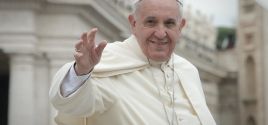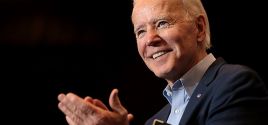Yes, You Do Understand Economicsby Michael McKaySep. 16, 2015 |
Popular 
'This is Cruelty, This is Not War': Pope Francis Condemns Gaza Genocide in Christmas Message

Putin Accuses 'Ethnic Jews' of Tearing Russian Orthodox Church Apart

Biden Commutes Sentences of 37 of 40 Federal Death Row Inmates - Excludes Robert Bowers, Dylann Roof

Ohio Senate Passes Bill Aimed at Outlawing Criticism of Israel, Criminalizing Gospel

Saudi National Rams Car Into Germans at Christmas Market in Suspected Terrorist Attack [UPDATED 2X]
  The other day I was having coffee with a new friend, a retired businessman who customized luxury cars in California. I mentioned I had recently retired from owning an investment firm and had many years of study of economics, especially Austrian Economics. The other day I was having coffee with a new friend, a retired businessman who customized luxury cars in California. I mentioned I had recently retired from owning an investment firm and had many years of study of economics, especially Austrian Economics.As so many people I have met before him, he said, "I really don’t understand economics and always have been confused by it." To which I surprised him with, "Of course you understand economics; it is the thought process you use every day to deal with three things: Scarcity, Property and Relationships." His eyes got big and he said, "Whoa! Say that again." "OK", I said and continued, "Everything in human life is organized around how we decide about three things: Scarcity, Property and Relationships. "First let's talk about Scarcity which you've known about all of your life -- you notice when something is missing or about to be missing; it is how you decide when it's time go to the grocery store, do your laundry or whether you should drive your car faster so not to be late for an appointment. "Every human being is an expert in the decision process of Scarcity. It is something we all naturally do whenever we act and choose -- which, by the way, we are doing all the time, every day, all day long." I smiled, "I could go on and on. You want more?" "Sure.", he smiled back. "All humans make action and choice decisions that automatically weigh the following factors (Here I am counting on my fingers): * Knowledge: What do we know? * Risk & Uncertainty: What is our estimate of the risk we can foresee? , and at the same time, what is our guess at what is missing – What do we Not know? * Time & Priority: When do I want/need this, now or later? , and, How important is this to me right now in relation to other options? * Value: What am I willing to give up to have this thing right now? "If you were to think about this, every one of these factors are constantly part of your decision process all of the time -- and have been since you were born. Every human being thinks about these things. However, we all think about these: Differently, and, Differently about different things, and, Differently about different things -- and even the same things – at different times, as well. "This is the personal way you understand economics; it's the decision process that every human being goes through every time they act and choose, even if it is only for me, alone. "But there is another important way you already understand economics, which is how we interact with others. That is why I mentioned Property and Relationships because here is where the decision process I outlined above takes into account other people. "Economics is also about how we decide how we will think about – and therefore organize – our Property and our Relationships." After a long pause my new friend then said, "Wait a minute. You haven't talked about money. Even I know that economics is the study of money." To which I said, "The study of money and monetary exchange is the most applied use of economic theory. And this is to be expected. "Why? Because of Property. "You probably already know that money is a medium of exchange. (He nods Yes) But what are we exchanging? We are exchanging Property, your property for my property. "It is most valuable to think that there are TWO conversations happening during every monetary -- or Property -- exchange. "The First Conversation is the one I am having with myself; when I give $3 for this fancy cup of coffee I am saying, ‘I value that coffee more than the $3 in my pocket.'” "The Second Conversation is the one the cafe owner is having with himself. He is saying, ‘I value your $3 more than the coffee I have for sale.'” "Money is the handiest form of Property so I don't have to try to exchange a fish or a chicken for a cup of coffee, for example (to which he laughed)." I continued, "The real use of economics is in the conversation of how we organize ourselves in groups. Do we peacefully respect each other's Property? Do we peacefully cooperate with a shared sense of peaceful-values or is it that fearful-values are forced on us by some Single Dictator, as in a single person, or a Group Dictator, which is otherwise called democracy, by the way." At this point my new friend was squirming and said, "So, really economics is based on politics." I said, "Actually, it's the other way around. If you like, I can send to you a great little essay written in 1850 that clarifies this. The writer's name is Bastiat and he explains that economic architectures precede political architectures. "In other words, if you look at politics as simply an argument of how we should organize ourselves, then it becomes obvious that it really boils down to how we know, or don't know, what Property is and how we should deal with it as we relate to each other in life and living. "This is what I was referring to when I said that economics is also about Relationships. The connection between economics and politics is how we organize our Relationships and whether our "Shared Values" assume we can have (and want to have) a society based more on peaceful cooperation -- or not." As all conversations go, it became apparent that it was time to wrap this up, so I said, "Well, there you go. I have been studying this for a long time. If you would like to learn more I can direct you to learn about these things in a step by step way." To my surprise, he said, "No, let's continue. This is very interesting. But one thing bothers me. Are you also saying that humans don't need rules and laws and that our so-called 'self interests' are enough to keep us humans interacting in a more peaceful way? The News is too full of the horrors of humanity to swallow that one." I replied, "Well, it is true that the media is mostly reporting bad news. And there are definitely places and times throughout the world where the balance was and is greater violence of man against man. "But it is also true that this exists against a backdrop of a pretty darn peaceful world overall. On any average day, you are more likely to end the day peacefully in bed than being the victim of some violent or unfortunate occurrence. "There are many, many examples of Shared Peaceful Values that we -- the world over – rely on in our daily life, that show this to be true. My favorite is the freeway. Here we move along at speeds that easily can kill us and yet we all -- mostly and most of the time -- peacefully cooperate. "Note the following: 1. We do so out of our own self-interest to get where we want to go safely. 2. We do so defensively because we always know that risk and uncertainty of a violator is always there. 3. We are mostly peaceful and arrive safely at our destinations – most of the time. 4. We have remedies for when violations occur. In other words, rules have to be there and remedies have to be there because there will always be situations where the peace is disrupted either accidentally or intentionally by someone else. "But let's talk next time about whether we need to organize ourselves around an assumption that the only way people will peacefully cooperate is via some agency being given the exclusive use of force OR whether there are other ways that we can both have rules, laws and remedies and -- at the same time -- a higher order of Peace, Prosperity and Freedom. "Because there is a way." _ Michael J. McKay is the founder of www.RadioFreeMarket.com and the author of Secrets About Money That Put You At Risk. |



